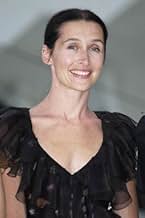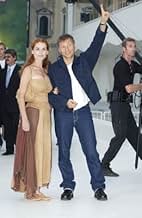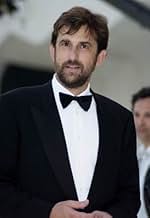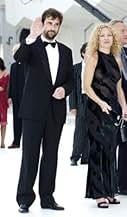IMDb RATING
6.3/10
2.5K
YOUR RATING
A New York thief, a tough-as-nails hundred-year-old woman, two brothers from the Wild West, a Macedonian revolutionary and a beautiful pregnant woman, all cross paths in a tale that spans tw... Read allA New York thief, a tough-as-nails hundred-year-old woman, two brothers from the Wild West, a Macedonian revolutionary and a beautiful pregnant woman, all cross paths in a tale that spans two continents and three centuries.A New York thief, a tough-as-nails hundred-year-old woman, two brothers from the Wild West, a Macedonian revolutionary and a beautiful pregnant woman, all cross paths in a tale that spans two continents and three centuries.
- Awards
- 1 nomination total
Joseph Mosso
- Church bell
- (as Joe Mosso)
- Director
- Writer
- All cast & crew
- Production, box office & more at IMDbPro
Featured reviews
Milcho Manchevski establishes new guidelines for independent movie makers, successfully balancing between Hollywood commercial and the independent art film. Only few compromises and hybrids like this have proven worth filming (and watching) and I was pleasantly surprised with the outcome.
First of all, there was the careful choice of names - Luke and Elijah (biblical names) opposed to the prostitute Lilith (female demon). No wonder that Lilith was in so many ways connected with water and finally she drowned. Than, there's Neda (from an old Macedonian poem "Serdarot" by Grigor Prlichev, awarded first prize at Athens). Then, a thing which impressed me was the short appearance of certain characters like Sigmund Freud, Pablo Picasso and Josip Broz Tito. Manchevski has used his old "trick" from his first film "Before the Rain" - non-linear time, but while in "Before the rain" the explanation was "The circle is not round, time never dies" in "Dust" it is "The centuries do not follow up each other but coexist like parallel universes".
Repentance was an important motif in the movie, especially the repentance of Luke and Edge.
Certain scenes have moved me, the scene in the hospital when Angela dies and the nurse is asking Edge what is he to her... The scene in Macedonia, when the women are laundering the carpets on a rocky waterfall (Mariovo)... And another thing - me as a Macedonian have always been brought up with the notion that our freedom fighters were noble men who were usually victims of blood thirsty Turks, but this movie had an interesting point that they were all butchers and murderers whose only lust is not freedom or fight against oppression but GOLD!
Probably this movie doesn't have the prophetic touch of "Before the rain" clearly displayed in the current political situation in Macedonia, but there's again the scene with Albanian gangs killing innocent Macedonian cattle breeders.
And another thing - both Angela and Luke are mocking the official clerical (church) "authorities", when Angela refuses the confession of the catholic priest on her death bed and when Luke kills the local orthodox priests offering assistance in the negotiations with the Turks (by the way, the priest is a traitor, which questions another illusion of mine and my generation - that the priests and the Church have been very active in protecting the Macedonian villagers from oppression and torment).
I know one thing for sure - that as soon as I am able I will use my proud privilege to be a Macedonian and visit Mariovo, where a part of the movie was made, and especially the bridge where the Turks attempted to pass so many times during the 17-th century and did not succeed.
The tension seems to fade at some points and that's why the rate of "9" form my user's vote, but still, this is an excellent complete product, made with the touch of perfect craftsmanship.
First of all, there was the careful choice of names - Luke and Elijah (biblical names) opposed to the prostitute Lilith (female demon). No wonder that Lilith was in so many ways connected with water and finally she drowned. Than, there's Neda (from an old Macedonian poem "Serdarot" by Grigor Prlichev, awarded first prize at Athens). Then, a thing which impressed me was the short appearance of certain characters like Sigmund Freud, Pablo Picasso and Josip Broz Tito. Manchevski has used his old "trick" from his first film "Before the Rain" - non-linear time, but while in "Before the rain" the explanation was "The circle is not round, time never dies" in "Dust" it is "The centuries do not follow up each other but coexist like parallel universes".
Repentance was an important motif in the movie, especially the repentance of Luke and Edge.
Certain scenes have moved me, the scene in the hospital when Angela dies and the nurse is asking Edge what is he to her... The scene in Macedonia, when the women are laundering the carpets on a rocky waterfall (Mariovo)... And another thing - me as a Macedonian have always been brought up with the notion that our freedom fighters were noble men who were usually victims of blood thirsty Turks, but this movie had an interesting point that they were all butchers and murderers whose only lust is not freedom or fight against oppression but GOLD!
Probably this movie doesn't have the prophetic touch of "Before the rain" clearly displayed in the current political situation in Macedonia, but there's again the scene with Albanian gangs killing innocent Macedonian cattle breeders.
And another thing - both Angela and Luke are mocking the official clerical (church) "authorities", when Angela refuses the confession of the catholic priest on her death bed and when Luke kills the local orthodox priests offering assistance in the negotiations with the Turks (by the way, the priest is a traitor, which questions another illusion of mine and my generation - that the priests and the Church have been very active in protecting the Macedonian villagers from oppression and torment).
I know one thing for sure - that as soon as I am able I will use my proud privilege to be a Macedonian and visit Mariovo, where a part of the movie was made, and especially the bridge where the Turks attempted to pass so many times during the 17-th century and did not succeed.
The tension seems to fade at some points and that's why the rate of "9" form my user's vote, but still, this is an excellent complete product, made with the touch of perfect craftsmanship.
Firstly, I'm a huge David Wenham fan. Didn't read anything about the plot before renting it. I was really surprised by the film's beginning, having no cowboys or Macedonians in sight. This was an interesting Rashomon-like tale, but I really didn't care for two of the storytellers - the old lady and the burglar. I think the story would've worked better just told from the two brothers point of view; no silly subplot about gangsters and gold coins.
Joseph Fiennes is hardly in the movie, and when he is, he mostly quotes the Bible in a horrid accent. David Wenham's American accent was even worse. For me to say anything negative about Wenham...it must be really bad. He also screamed in anguish at the sky so much I could only think "Mendooooza!" (from the Simpsons' "McBain" movies). Visually, this film was very beautiful, not just because of a handsome lead either, but very engaging use of colors, costumes and landscape. The way images from the past and future collided was very cool. The gun-fight scenes were well choreographed, and pretty damn bloody. Perhaps that's why I found the old lady's section less interesting - less action, less exotic locations.
A few laughs, a few gasps, a bit of sex, a lot of violence, but just too thin of a story. If you arrange the brothers' tale minus the gimmicky time-jumps, the movie would be about an hour long, not 2+ hours. I can't figure why the director didn't just fatten the characters and context of their story and tell it straight through. This is a movie about storytelling, but viewers need a better story. And David Wenham deserves a better movie. Preferably one where he can speak more naturally.
Joseph Fiennes is hardly in the movie, and when he is, he mostly quotes the Bible in a horrid accent. David Wenham's American accent was even worse. For me to say anything negative about Wenham...it must be really bad. He also screamed in anguish at the sky so much I could only think "Mendooooza!" (from the Simpsons' "McBain" movies). Visually, this film was very beautiful, not just because of a handsome lead either, but very engaging use of colors, costumes and landscape. The way images from the past and future collided was very cool. The gun-fight scenes were well choreographed, and pretty damn bloody. Perhaps that's why I found the old lady's section less interesting - less action, less exotic locations.
A few laughs, a few gasps, a bit of sex, a lot of violence, but just too thin of a story. If you arrange the brothers' tale minus the gimmicky time-jumps, the movie would be about an hour long, not 2+ hours. I can't figure why the director didn't just fatten the characters and context of their story and tell it straight through. This is a movie about storytelling, but viewers need a better story. And David Wenham deserves a better movie. Preferably one where he can speak more naturally.
It's unusual a film will have as many good ideas as this and so many striking ideas and images and still not be a success. Perhaps it's because there are simply too many striking visuals and set-pieces - other directors would have built whole films around just one or two of the concepts contained here - for one film to cope with all of them. Essentially, the story is of a burglar (Lester) who breaks into a house of an old woman (Murphy) in New York and she tells him the story of American cowboys (Fiennes and Wenham) in the Ottoman Empire in Macedonia and their tangled fraternal love/hatred when confronted with a beautiful woman. It's a story that dips in and out of narrative timelines. Sometimes it's New York and sometimes it's the Old west and sometimes it's old Macedonia - and sometimes it's bits of all of them. And sometimes it's just fantasy. Reality, illusion, truth and cinematic deception are all part of the mix. Director Machevski is not here to give the viewer an easy ride. He is an intelligent man and he expects intelligence of his viewers. However, in return he offers some beautiful images that pay homage to spaghetti westerns while adding a sly twist of knowing humour. It's violent, but there's a blackly funny element to it that's closer to life than the comic-book stock-in-trade of such directors as Tarantino (and rightly so, Macedonians have seen more real-life warfare than most Hollywood filmmakers).And despite this, it's a movie that's life-affirming (not in the easy way - you really have to like life to have it affirmed here). The performances are variable. Wenham and Fiennes have both done better in the past and you have to hope they'll do better in the future. But in Lester and Murphy, there are two actors who are in full command of the camera. There's not an emotion you'll feel that they haven't carefully worked to create. Simply beautiful work. With a greater distribution, this is would have built a considerable cult following. Not easy-going, pop-corn-chomping stuff, but highly recommended.
In modern New York, a thief (Adrian Lester) breaks into an old woman's apartment. She surprises him and holds him at gunpoint. She tells him the story about two brothers in the turn of the century. Elijah (Joseph Fiennes) and Luke (David Wenham) have a breakdown in relationship. Luke is drawn to the wild east in Macedonia where the Ottoman is battling a local revolt. He joins a group of bandits pursuing the revolt leader known as The Teacher for the lucrative reward. He gets taken prisoner by the Turks who is joined by his hated brother.
Filmmaker Milcho Manchevski has taken on too much for one movie. It's trying to do too much and ends up stepping on each other. It may work better as an old style violent spaghetti western. Even taken separately, the narrative flow is a bit disjointed. The modern part only adds the trans-generational story. The robbery part isn't that compelling. Without knowing either character, there is nothing to root for or against. It's often problematic to have a character tell the story of the movie. The reliability of the telling is suspect. It's also trying to have some surreal poetry about flying. It's doing too much and gets muddled. This is definitely ambitious and probably too ambitious for its own good.
Filmmaker Milcho Manchevski has taken on too much for one movie. It's trying to do too much and ends up stepping on each other. It may work better as an old style violent spaghetti western. Even taken separately, the narrative flow is a bit disjointed. The modern part only adds the trans-generational story. The robbery part isn't that compelling. Without knowing either character, there is nothing to root for or against. It's often problematic to have a character tell the story of the movie. The reliability of the telling is suspect. It's also trying to have some surreal poetry about flying. It's doing too much and gets muddled. This is definitely ambitious and probably too ambitious for its own good.
After having read some reviews of 'Dust' I was not sure if I wanted to see it or not. However, the "David Wenham infatuation" prevailed in the end, and I went as far as to actually purchase the film. It was money well spent, you could say. While the movie would not appeal to general audiences, it left me awestruck. I ended up watching it again, on the same night.
"Wow" is how I describe feeling after the credits rolled (the first and the second time). I don't want to spoil anything for those who have not seen the movie, so I'll just stick to my reactions to it. There was laughter, there were tears, there might have been an "eww" once or twice, there were definitely lustful thoughts of David Wenham (he's rather cute, you know). Acting was superb, though I'd like a few words with the 'dialect coach' (hint: the leads are not American). All in all, a great movie. I highly recommend seeing it at least once.
"Wow" is how I describe feeling after the credits rolled (the first and the second time). I don't want to spoil anything for those who have not seen the movie, so I'll just stick to my reactions to it. There was laughter, there were tears, there might have been an "eww" once or twice, there were definitely lustful thoughts of David Wenham (he's rather cute, you know). Acting was superb, though I'd like a few words with the 'dialect coach' (hint: the leads are not American). All in all, a great movie. I highly recommend seeing it at least once.
Did you know
- TriviaDust caused quite a stir when it premiered. A number of European critics viewed Manchevski's film as an extension of his recent op-ed piece in The Guardian. The op-ed asked NATO to take responsibility for a civil war in his homeland Macedonia - even though Dust was finished before the war even began.
- GoofsThe old woman Angela's (Rosemary Murphy) refrigerator dispenses the gold coins from the story, even though they were all scattered at the Turkish camp by Luke (David Wenham) when he came for Neda (Nikolina Kujaca).
- How long is Dust?Powered by Alexa
Details
- Release date
- Countries of origin
- Official site
- Languages
- Also known as
- Justice de l'ouest
- Filming locations
- Production companies
- See more company credits at IMDbPro
Box office
- Budget
- $11,000,000 (estimated)
- Gross worldwide
- $108,698
- Runtime
- 2h 7m(127 min)
- Color
- Sound mix
- Aspect ratio
- 1.85 : 1
Contribute to this page
Suggest an edit or add missing content



















